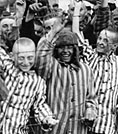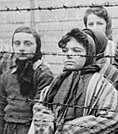| 1. |
 Think
of images you associate with the term liberation and
jot down any words or phrases that come to mind. Listen
to Edith Birkin's account on liberation. Does the situation
she describes match up to any of the words you selected?
If not, why not? Explain your response in written form. Think
of images you associate with the term liberation and
jot down any words or phrases that come to mind. Listen
to Edith Birkin's account on liberation. Does the situation
she describes match up to any of the words you selected?
If not, why not? Explain your response in written form.
|
| 2. |
Edith
Birkin describes liberation from Auschwitz
as "the very worst time". On liberation from camps,
survivors encountered a whole set of problems.
- Make
notes on what you consider the immediate and long-term
effects of the camps would be on survivors.
-
Use the oral testimonies, together with your responses
to fill in the Student worksheet: Liberation.
|
| 3. |
Today
there is still controversy over whether to grant compensation
to Holocaust
survivors. As well as survivors, there are also families
of those killed in the Holocaust who are making claims
for property, which was stolen or looted by the Nazis.
-
Find newspaper accounts describing these situations.
For example consider requests from families
to return pieces of artwork, which were looted
by the Nazis. Sometimes the provenance of the
artwork is unknown and stolen paintings were
bought in good faith. Some are currently exhibited
in art galleries around the world.
- What
are galleries doing to address this issue?
- List
some of the problems/issues that arise concerning
compensation.
|
 |
|
| 4. |
The
concepts of justice or vengeance receive media coverage
relating to current world issues. Should justice or
vengeance apply to Nazi War criminals who are still
being tried today?
- Having
listened to the testimonies in Topic 5 decide whether
you think Nazi perpetrators,
collaborators
or bystanders
should be punished so long after the Holocaust.
- Create
a discussion forum to debate these issues.
|